In an otherwise monochrome Glasgow childhood, Lisbon came to insinuate itself into my misty consciousness. Long before I knew it was a foreign city or discovered the source of its significance to the adults in my family, Lisbon took its place in my four-year-old lexicon of places and destinations. In 1967 this would not have stretched much beyond “Granny’s house”, “the back garden” and “the bad fire”.
Gradually, during birthday parties, communions and endless baptisms, propaganda from my dad and uncles began to form and settle. When the time came for me to attend school, the story of Lisbon and Jock Stein and Celtic and Internazionale had been stitched into my mind. I’m not sure if the concept of a pre-school education was fully formed in Scotland in the 1960s, but in my neighbourhood it began and ended with the legend of the Lisbon Lions. There was geography and history; word recognition and recall; heroes and villains. How many exasperated primary school teachers all over west central Scotland in the late 1960s fretted over the inability of Tam and Rab to read Janet and John or add two plus three yet somehow talk freely and with some authority of Simpson, Craig and Gemmell; of Zurich, Nantes and Vojvodina Novi Sad?
On bended knee at bedtime before a statue of the Blessed Virgin, my brother and I entreated God to bless mum and dad, Gran McKenna and Gran McCabe, and all our aunties and uncles. “And bless Jock Stein too,” my dad would remind us. A few years later I clearly recall a heated conversation among my uncles and a visiting priest on the subject of special papal dispensations. The bewildered padre had been asked to pronounce on whether a case could be made for Stein to become a saint on the basis that, even though he wasn’t a Catholic, he had delivered the requisite and verifiable miracle.
In my later school years, long after a working grasp of the basic Lisbon narrative had been established, my friends and I took turns to distinguish ourselves with a more rarefied knowledge; one that could only have been obtained by hours of extracurricular study. This, of course, was subject to a degree of exaggeration. “Did you know that Billy McNeill conducted all of his press conferences before the away legs in the language of his hosts?” That this would have required the Celtic captain to have possessed a working knowledge of French, Swiss, Yugoslavian, Czechoslovakian and Portuguese was never challenged. “And did you know that my dad’s pal’s fiancée ditched him after he used the deposit on their new house to fly to Lisbon?”
In the early years that followed Celtic’s triumph in Lisbon, one book came to be recognised as the bible on all that occurred around the game. Celtic Triumphant was written by the highly respected football journalist Ian Peebles and remains to this day the ultimate authority on the matches Celtic played that season, and the anecdotes and recollections of the players and people who were there. Many other books have been written in the decades since but the freshness, authenticity and sheer sense of wonder of Peebles’ work, penned as it was in the immediate aftermath of Lisbon, will never be matched.
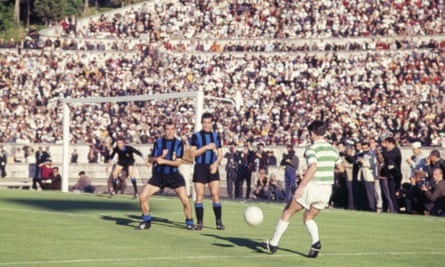
At university I discovered my friend Aidan McLaughlin and I shared a guilty secret: we had both memorised entire paragraphs of Celtic Triumphant. This is Peebles’ recollection of Steve Chalmers’ winning goal in Lisbon: “Then, six minutes from the end, to the delight of the Scots and the obvious satisfaction of foreign journalists all around me, Steve Chalmers scored the winner from a pass by Murdoch after a fine through ball by Gemmell the Great. Said a leading Swiss writer: ‘It’s wonderful … Celtic are a team with eight forwards!’ A Frenchman beside him smiled at me and said: ‘We must all play the game your way now.’ Being a Scot in the National Stadium at that moment was the supreme status symbol. Meanwhile, after token resistance from a sympathetic police cordon, Celtic’s supporters took control of the field.”
On one level, Celtic’s 2-1 victory in the European Cup final over Internazionale, the champions of Italy, must stand as Scotland’s greatest sporting achievement. Football then, as it is now, was the most popular sport in the world in terms of participation and commerce. That a squad consisting purely of men from the west of Scotland with no advantages or privileges of finance or sports science could win the world’s premier football tournament was considered improbable then. It would be regarded as well-nigh impossible now.
Yet, Celtic’s victory carried much more significance than the mere fact of a Scottish team becoming the first from Britain to prevail in football’s most prestigious club tournament. Lisbon ’67 was a watershed moment for Scotland on cultural, social and political levels. Let’s consider the style and design of Celtic’s play in defeating one of the most successful clubs in the modern era. If anyone outside of the west of Scotland had been asked to imagine the type of football favoured by a team from Glasgow they might have deployed words such as “utilitarian”, “industrial” or “no-nonsense”. Glasgow in the 1960s was still in its No Mean City phase; a black and white city of heavy industry, joyless drinking and casual violence. A football team from this place would be hard, aggressive and inelegant. It would take no prisoners.
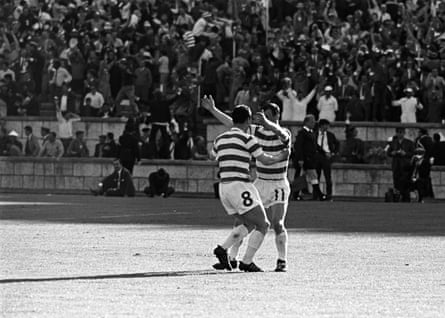
There was light and joy in Celtic’s play though and an exuberance that you might more commonly associate with Latin or African countries. It belied the grime and industrial drudgery of the places where the Lisbon Lions were reared. Sure, they were no snowflakes and Stein had instilled a good old-fashioned Presbyterian work ethic in their approach. Yet, as Celtic progressed through the 1966-67 European Cup, foreign journalists and supporters were surprised at their high levels of skill and enlightened tactics, which demanded that every outfield player had quick feet and sharp brains. Within a few years Dutch coaches and footballers would be lauded for having invented the concept of “total football”. In truth though, Celtic had been playing that way for several years.
Before Celtic won the European Cup, the only prolonged exposure Scotland had ever enjoyed in front of a mass audience would have been the Hollywood classics Whisky Galore and Brigadoon. On the afternoon of 25 May 1967 a global audience sat down for two hours to watch an authentically Scottish product prevail under the most searching conditions. The product was seen to be charismatic and attractive and, in the minds of 40 million foreigners, a mental recalibration of previously held thoughts about Scotland and Scots took place.
Did Scotland enjoy a rare wee jag of confidence in that hour? Did we experience for a few precious minutes what it must feel like to be a citizen of one of those famous, beautiful countries endlessly favoured by Hollywood location directors? We Scots can be tetchy and disputatious, often plagued by confidence issues, and forever soliciting other people’s opinions of us. In the first chapter of Celtic Triumphant, the author observed something rapturous afterwards: “There were Celtic and Rangers supporters; Protestants and Catholics; Pakistanis and pop fans; and all of them were rooting for the Parkhead players in Lisbon. As the final whistle blew, many an impromptu jig was danced on a lounge carpet and lifelong Rangers followers have since admitted to a lump in their throat which they couldn’t control.”
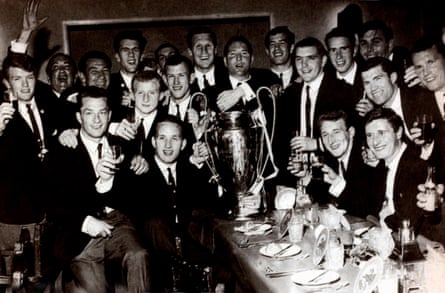
In Celtic’s triumph we discovered that Scotland was well-regarded in other countries. We felt a residual fondness for this country that had probably existed, unspoken and not observed, for many years. The source for some of this could have been a high regard for our education and our ability to build ships, bridges and railways. Nor can you discount Scottish regiments’ heroism in two world wars and our pleasant trade dealings with most of Europe over centuries when London’s East India Company seemed only to want to exploit them. After Lisbon, though, there was a continent-wide outpouring of goodwill towards Scotland, expressed through admiration for the exploits of its champion football team, Celtic FC. “A pleasure to meet you again after all these years,” Europe seemed to be saying as a team of Scots charmed them.
In their tall, blond captain, Billy McNeill, Scotland had a champion for the new age. Here was a man who, as Celtic progressed through Europe, insisted on speaking to the local press in Switzerland and France, in their own language. This was a working class Scottish lad who did not possess the advantage of a university education. McNeill, in the way he held himself and in the manner with which he conducted himself, became a symbol of aspiration for many others from unprivileged backgrounds. If McNeill was typical of ordinary Scots, then we as a nation had much to be proud of.
And in Stein Scotland had produced an articulate philosopher whose musings on football were influenced by his socialism and his years toiling underground as a miner. Here was a man who, you felt, would respect captains and kings but never have considered himself inferior to them. For many working class Scottish people, these two men became a totem: an example of what they might aspire to just as the concept of comprehensive education and free university access began to raise the expectations of a previously disadvantaged people.
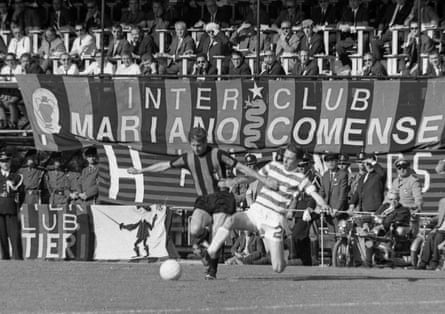
What is more, Celtic, in being managed by a Protestant and including several Protestant players were, at last, a team that transcended the ancient west of Scotland religious tribalism. This was the moment perhaps when many who had not been reared in an Irish Catholic household felt they could give their support to Celtic and possibly even identify with them. Might this have been for many Celtic fans the first time they felt proud of their Scottishness and fully comfortable in their Scottish skins?
All of this happened during the summer of love, when counter-culture became the mainstream; when it was acceptable for men to grow their hair and sport clothes with flower motifs. For a few months it seemed as if the world’s problems did not have to end in bloodshed. It was the young people’s decade and perhaps Scotland, ever on the edge of great happenings and with its nose pressed up against the window, had made its own contribution and had at last caught up with the spirit of the age.
Until 1967 the experience of my dad’s generation of lowland, working-class Scots was of heavy industry for poor wages; of ill-health and premature death. It was to be thwarted by the failure to access a university education and a secure profession. It was the frustration of being unable eloquently to express their character and their intelligence. It was the resentment of always being portrayed by scholars, writers and film-makers as ill-educated, malevolent and unsophisticated. Nye Bevan and Harold Wilson began to give them hope as they started the process of unstitching embedded privilege and opening doors that had always been closed in their faces. I like to imagine that Jock Stein and the Lisbon Lions might have made a contribution to that process.

Distressingly, I have heard murmurs among some that they have had enough of celebrations to mark landmark anniversaries of Celtic’s triumph in Lisbon. We’ve had festivities to mark the 19th, 21st, 25th, 30th, 40th and now 50th anniversaries. And until the last one of them takes his last breath I hope we will continue to honour them and throw banquets for them. It is the least that these 11 anointed men deserve for making a nation walk tall once more.
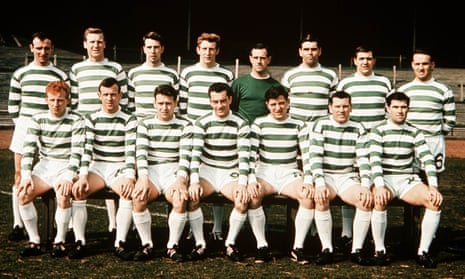
Comments (…)
Sign in or create your Guardian account to join the discussion